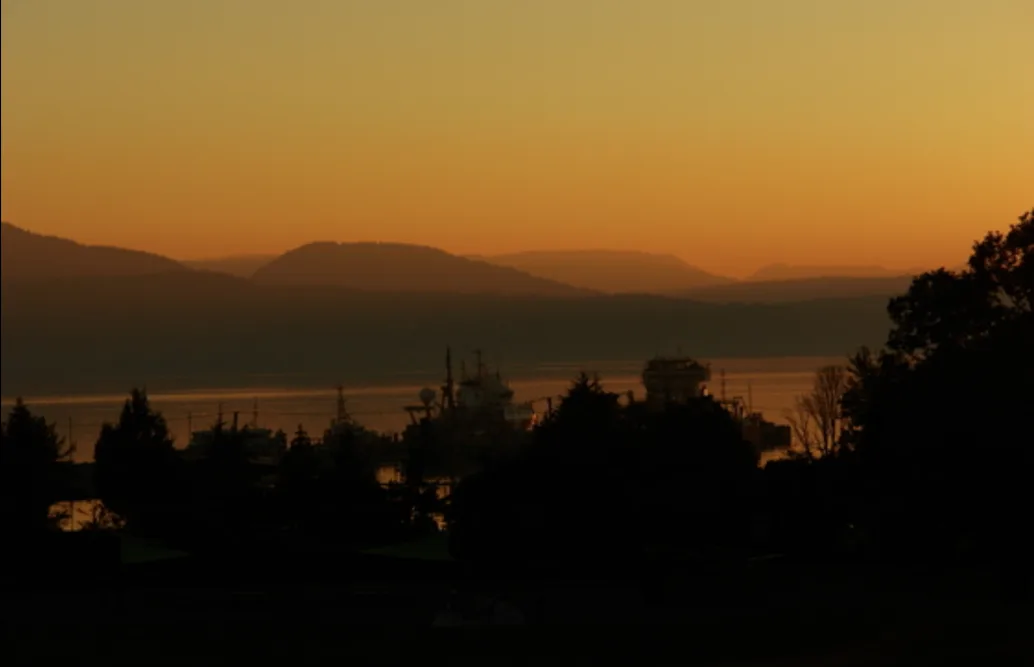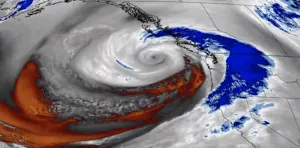
Are my symptoms related to COVID-19, or the wildfire smoke?
Much of southern B.C. has been shrouded in haze for days, the air feeling thick and chalky, the light giving off an ominous orange hue.
Smoke from the wildfires raging in Washington state and Oregon has drifted north, prompting Environment Canada to issue a special air quality statement for all but the northern third of the province. A live air tracker lists Vancouver's air quality as among the worst in the world, along with Portland and Seattle.
For many B.C. residents the haze is anxiety-inducing at an already anxious time, and reminiscent of the province's worst wildfire season, when much of the province was cloaked in smoke. But the low air quality can also have very real physical health effects, at a time when respiratory health is already top of mind.
WATCH BELOW: EERIE DRONE FOOTAGE SHOWS NEIGHBOURHOOD COMPLETELY LEVELLED BY WILDFIRE
So if you're feeling under the weather — how can you tell whether your symptoms are related to COVID-19, or a side effect of poor air quality?
Sarah Henderson, a senior environmental health scientist at the B.C. Centre for Disease Control, said that distinguishing between the two can be "tough," as many symptoms of COVID-19 and signs of irritation from smoke can be similar.

Smoky skies in Patricia Bay, B.C. on September 11. Courtesy: Frank Towler.
But there are some tell-tale signs to keep in mind.
"There are some symptoms of COVID that we really wouldn't expect to be associated with smoke ... things like a fever, body aches, chills — those types of symptoms are unlikely to be caused by the smoke. However, there are symptoms that are very similar between the two and that's a dry cough, sore throat, runny nose, and a headache," she said.
"If you're having difficulty breathing that's a medical emergency — whether it's COVID or smoke-related — and you should call 911."
WATCH BELOW: U.S. WILDFIRE SMOKE IMPACTING NORTH AMERICA
Henderson said if you've experienced poor air quality before, it can be useful to compare your symptoms to ones you may have had previously.
"We've had these big smoke exposures in British Columbia before, so were you sensitive to the smoke at that time? If you were, maybe that's what's happening again," she said.
But if you're unsure, Henderson advised using the B.C. COVID-19 self-assessment tool, or calling 811 for advice on how to proceed.
"If you may have COVID you definitely need to be tested," she said.
WILL MY MASK PROTECT ME FROM THE SMOKE?
The short answer is — yes, your mask will protect you from the smoke, to a certain degree, if it is fitted properly.
"One of the silver linings from my perspective about this whole terrible pandemic is we've learned quite a lot about masks and materials very quickly," said Henderson.
"The most important thing is how well the mask fits your face, because if you wanted to filter the smoke, the smoke can't go around the mask — it has to go through the mask — so there can't be any gaps around your face."
Henderson said the ideal cloth mask to protect against smoke is one with tightly-woven cotton and a layer of silk, but any mask with a double layer will provide some protection.
A well-fitted N-95 mask would provide the best protection, but as they are in short supply due to the pandemic, they aren't recommended for the general public.
Avoiding strenuous physical activity and having a portable air cleaner are also advised to reduce your risk, especially for people with pre-existing conditions like asthma, heart disease, or diabetes.
Henderson said the elderly, pregnant women, and children are the most at risk, and little is known about the effects of smoke on infant lungs, which are very delicate.
"The first thing is to know your susceptibility. If you have a condition, be aware. If you use respiratory medications, carry them with you at all times. Listen to your body, if your body is telling you that you're having difficulty with the smoke, take it easy and find ways to reduce your smoke exposure," she said, adding what B.C. residents are experiencing may be mild compared to what is happening south of the border.
"We're in a time where wildfire is becoming very extreme — and who knows what next year may bring."
This article was written by the CBC by Michelle Ghoussoub









